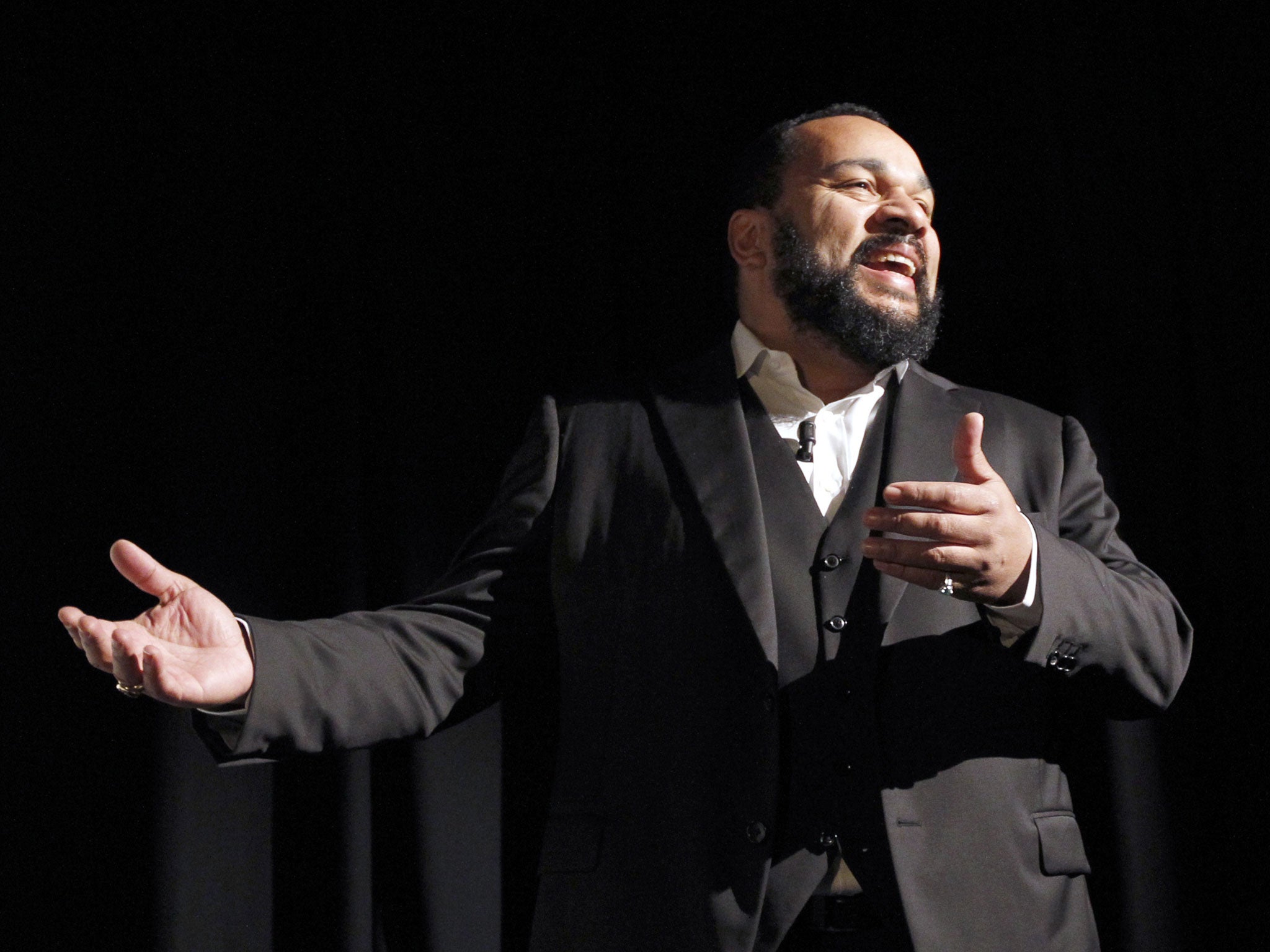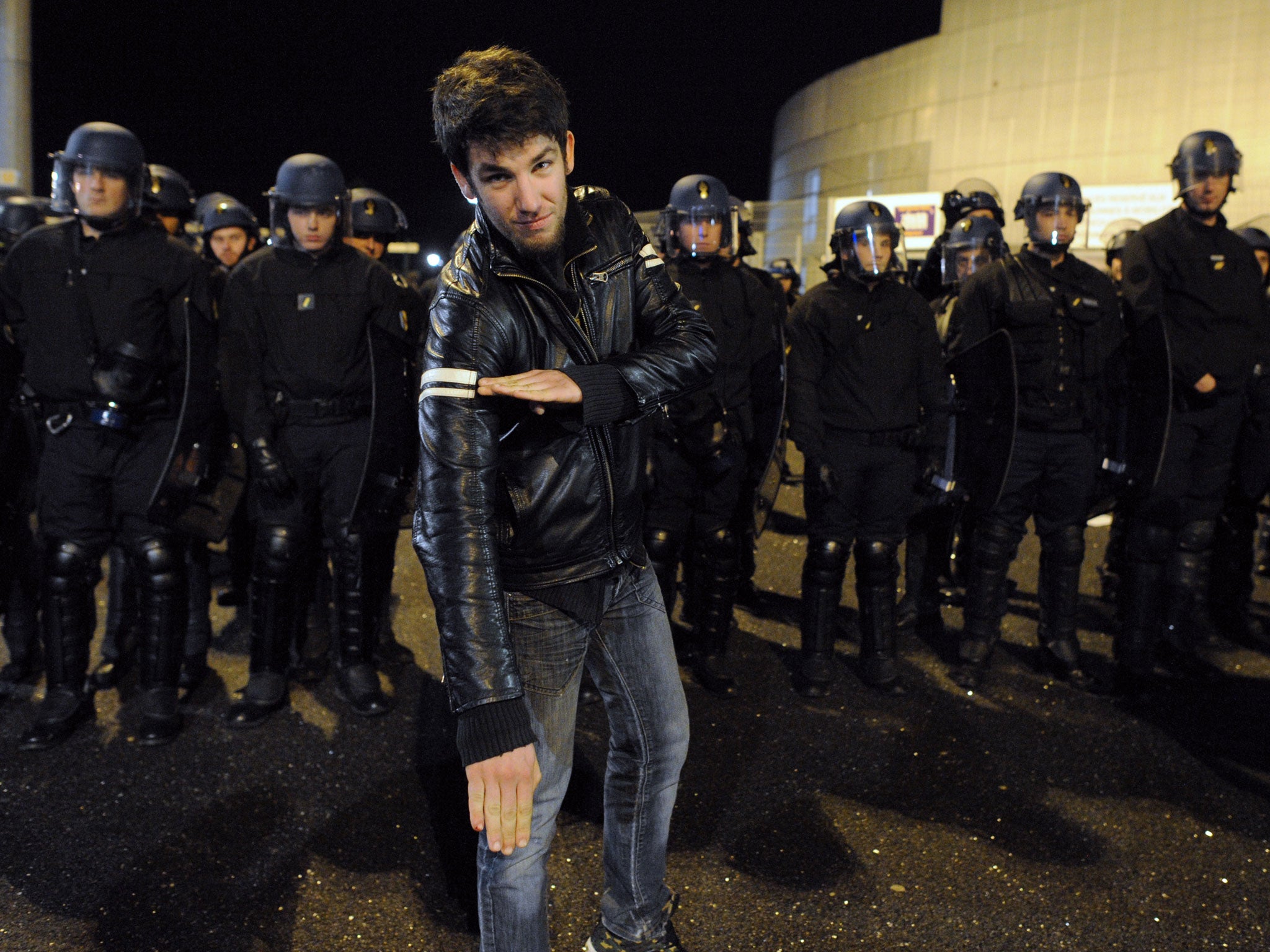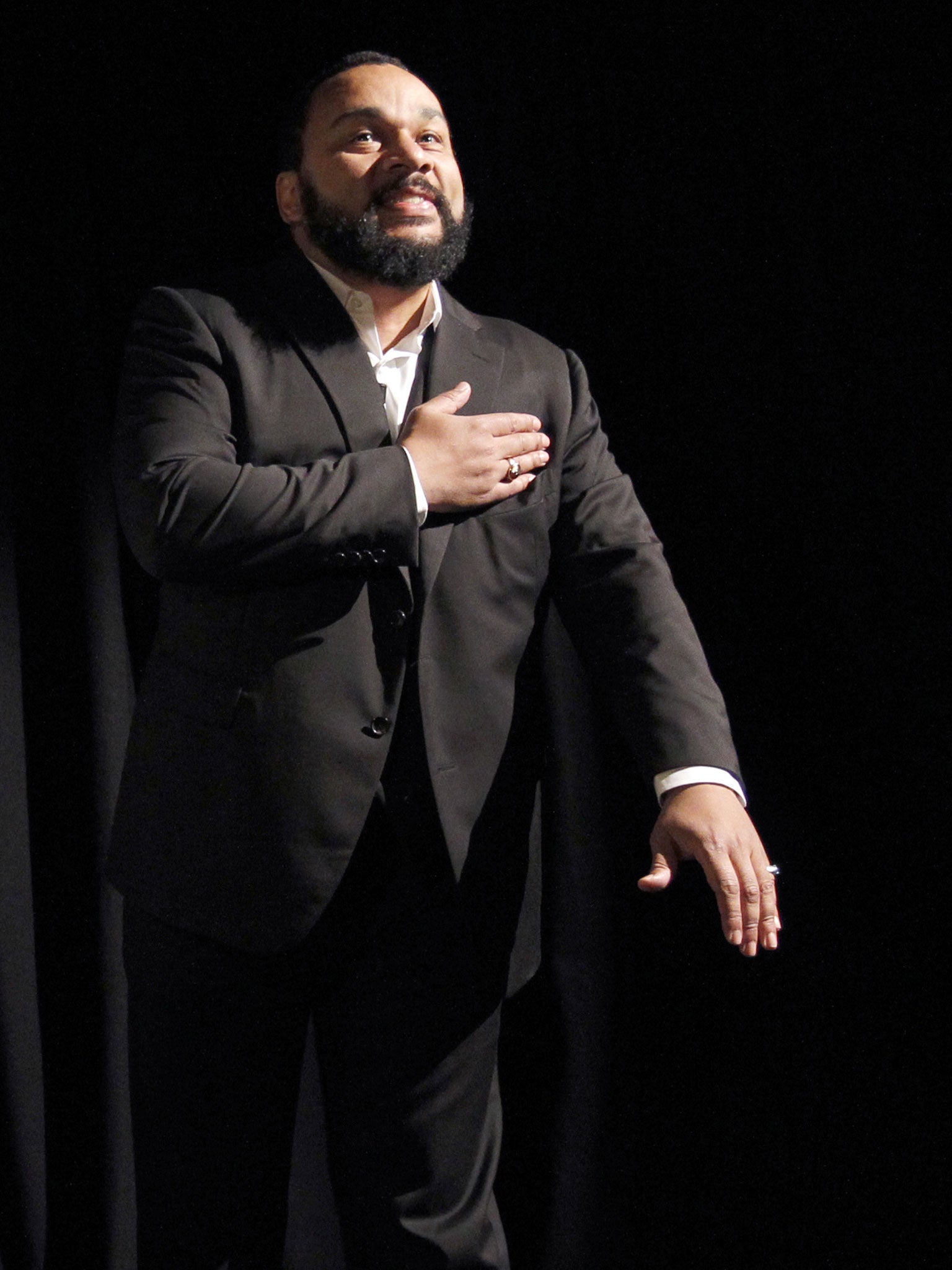An act of cruelty: An audience with Dieudonné M'bala M'bala, the man behind the 'quenelle' salute
Dieudonné M'bala M'bala is the man behind the 'quenelle' salute. His fans claim the stand-up represents free speech. Others say he is just a hateful anti-semite. John Lichfield joins the crowd at his latest gig

Your support helps us to tell the story
From reproductive rights to climate change to Big Tech, The Independent is on the ground when the story is developing. Whether it's investigating the financials of Elon Musk's pro-Trump PAC or producing our latest documentary, 'The A Word', which shines a light on the American women fighting for reproductive rights, we know how important it is to parse out the facts from the messaging.
At such a critical moment in US history, we need reporters on the ground. Your donation allows us to keep sending journalists to speak to both sides of the story.
The Independent is trusted by Americans across the entire political spectrum. And unlike many other quality news outlets, we choose not to lock Americans out of our reporting and analysis with paywalls. We believe quality journalism should be available to everyone, paid for by those who can afford it.
Your support makes all the difference.Dieudonné M'bala M'bala appears on stage to a feral roar from the audience, with his arms held aloft, more politician than comedian.
Which is he? No politician in France generates such raw excitement. No comedian produces such an intoxicating and disturbing cocktail of self-righteous laughter and joyous anger among his fans.
Howls of gleeful fury greet Dieudonné's every reference to a French politician, or to his alleged "persecution" by the French establishment. Louder howls and boos greet every reference to a Jew or to a Jewish organisation.
Dieudonné M'bala M'bala – the man who invented the controversial "quenelle" arm gesture performed by the Premiership footballer Nicolas Anelka – has belatedly started his 2014 stand-up Tour de France. The show replaces a performance banned by the French authorities earlier this month for inciting racial hatred against Jews.
Mostly, it is the same show, with the provocative anti-semitic quips taken out or replaced by pauses, which the audience cheers with passionate indignation.
Dieudonné is a compelling presence on stage: bearded, balding, black, very large and sometimes funny.
"What the fuck are all you lot doing here?" he asks. "The media and the politicians and the thinkers have ordered you not to come. You must all be crazy anti-semites, assassins and wicked sorcerers. I almost didn't turn up myself."
The performance is in the Bordeaux ice-rink – appropriate for a man who has been skating on thin moral and political ice for almost a decade. The audience of at least 5,000, which fills the venue to capacity, is predominately male. It is mostly white and working class. There are older people and some students, but the great majority seem to be in their thirties and forties. This is different from his usual audience in Paris, which is dominated by conspiracy-loving, far-leftist, bourgeois bohemians.
Dieudonné, half-Breton and half-Cameroonian, was born in the Paris suburbs 47 years ago. He first made his name as a cheeky, anti-racist comedian in a stand-up double act with a Jewish performer, Elie Semoun (one of the Jewish names booed at the Bordeaux show). He had several parts in movies, such as Asterix and Cleopatra. He campaigned, on and off the stage, against racism. He was, he said, a black man who refused "to dance the calypso with a banana stuck up my arse".
From about 2004, for reasons never explained, he metamorphosed into a French version of Louis Farrakhan, the controversial leader of the Nation of Islam in the US.

On stage, he sometimes speaks in a mock French-African voice, which the Bordeaux audience loves. The rest of the time, he speaks in rapid, colloquial, last-man-in-the bar, working-class French, which the Bordeaux audience adores.
When he reaches a banned part of the old script, Dieudonné pauses and grins or he stares suspiciously, and comically, into a "spy camera" that "They" have hidden in his lectern.
The fans know by heart from YouTube what Dieudonné is supposed to – or not supposed to – say next. Thus, he no longer says: "Why should I have to choose between Jews and Nazis? In all that business, I am neutral."
Instead, he stops and allows an innocent, yet conspiratorial expression to spread across his face. Cue, hysterical cheers and laughter.
Alternatively, Dieudonné gives a censored version of one of his anti-semitic "jokes". In the original show, Dieudonné would attack his frequent critic Patrick Cohen, the Jewish presenter of France's most successful morning radio news show (a cross-Channel equivalent of John Humphrys).
Dieudonné used to say: "When the wind turns, I don't think he'll have time to pack a suitcase. When I hear Patrick Cohen talking, you see, I think of the gas chambers. Pity."
In the revised show, Dieudonné casually mentions Patrick Cohen. (Hysterical booing from the audience). Then he says: "The wind is going to turn, maybe. We will see. I have a feeling that the wind is turning." (Hysterical laughter.) Dieudonné's Bordeaux fans, who have paid €43 each, resemble a pick-and-mix of the people that you might see at provincial, far-right or far-left rallies in France.
Random interviews suggest that they are a rather different set of people: just as angry; just as alienated; but apolitical. They are so furious with "the system" that they are beyond the reach of even populist politicians. They are not beyond the reach of Dieudonné. Their refuge, for now at any rate, is in his destructive, dark humour, rather than in organised politics.
No one will admit to caring much about Jews. It's all just a big anti-System joke, they say.
Cyril, 31, a vineyard worker, says: "I adore Dieudonné. He is not like all those other boring comedians, who go on about the same kind of stuff. He talks about life as it really is. He is educational.
"I'm not anti-semitic. Dieudonné is not anti-semitic," he goes on. "He laughs at everyone. But in this country, there is one community that no one is allowed to laugh at... By trying to ban him, they are proving his point. They are just making him even more popular."

Dieudonné's show is not all about Jews. His comedy is based on provocation; pushing things to the edge and then far beyond. There is often an undertow of violence. He is on the side of the ordinary people of France – white and black – and against the elites, with their hypocrisy and their fancy ideas, such as gay marriage.
In one skit, a French homosexual couple goes to Africa to buy a child. Dieudonné, playing a corrupt African official, says: "No, we are not homophobic in Africa. That word is not strong enough. We are homovore. We eat gays."
More hysterical laughter.
Is Dieudonné satirising African attitudes or white attitudes to Africans? He walks a tightrope. You can laugh at his corrupt, homophobic African or you can agree with him. But when it comes to Jews, Dieudonné steps off the tightrope. I count 23 references to Jews in a supposedly "cleaned up" 80-minute show.
There is nothing remotely funny in any of these references. Even with his gaps and pauses, Dieudonné's world view is as follows: the Jews run the world; they are responsible for the suffering of blacks and poor whites. Why? Because they have created a global monopoly of pity by manipulating the Holocaust.
Before the legally-enforced "re-write", his "jokes" on Jews and Nazi concentration camps were frequently drenched in obscenity. The audience in Bordeaux, trained by Dieudonné's videos and YouTube appearances, cheer apparently innocent references to pineapples. Along with the quenelle arm gesture – which may or may not be based on the Hitler salute – this fruit has become Dieudonné's emblem.
A couple of years ago, the comedian re-wrote an old French pop song and called it "Chaud Ananas" – hot pineapples. In French, this sounds like "Shoah nanas" or "holocaust floozies". One of Dieudonné's five convictions for inciting hatred of Jews was based on the words of this song, which incoherently mingle the holocaust, sexuality and obscenity.
The "quenelle" works the same way. Before the Bordeaux show, a wandering "quenelle camera" selected members of the audience. The chosen ones competed to give the most obscene and suggestive quenelle – pointing at the ground with one arm while touching their shoulder or upper-arm with the other hand.
Why is this obscene? Quenelle means an elongated meat-ball or fish-ball. In slang, it means a finger or a penis. Dieudonné's gesture means, symbolically, that you want to shove a "quenelle" as far as possible up the backside of your enemy. His Bordeaux fans, just like Nicolas Anelka, insist that Dieudonné's real target is "the establishment", not the Jews. The quenelle gesture is not anti-semitic, they say, even though it may "accidentally" resemble a Nazi salute.
Stéphane, 57, a building labourer, says that: "In the beginning, they started attacking him for a small sketch that he did on Israeli colonists on the West Bank. So he doubled the stakes and started mocking the holocaust. That's not anti-semitism. It's freedom of speech.
"Pineapples, quenelles, all these things: they have become a symbol, not of anti-semitism, but of resistance to the system. We have a right to mock the way things are run by a minority, against the majority, in this country.
The comedian's critics say that the Dieudonné M'bala M'bala phenomenon – and he is a phenomenon – works precisely the other way around. In the "Dieudonnosphere" (as his fans call themselves) the "establishment" and the "Jews" have become the same thing. People who start off vaguely anti-system are encouraged to become viciously anti-Jewish.
Looking around the people crowded into the Bordeaux ice-rink, it is difficult to believe that they were sincerely anti-semitic. Most have probably never met a Jew. And yet, in January 2014, to hear 5,000 people baying angrily at each mention of a Jew is deeply unsettling.
Dieudonné's show ends with three little girls called up on stage to perform their best and most obscene "quenelles".
The comedian then leads the audience in his newest anti-François Hollande song, which uses the beautiful melody of the anthem of the French wartime resistance, "La Chanson des Partisans". "Can you see, François, what is sliding up your bum? La quenelle."
Is Dieudonné a comedian or politician? First and foremost, he is a businessman. As the audience leave, they snap up T-shirts showing "Dieudo" doing the quenelle at €40 a time. There is also a man handing out leaflets for a book-signing in Bordeaux next month by Alain Soral, a virulently anti-semitic French intellectual, light years to the right of the Marine Le Pen and the National Front. Soral is a friend of Dieudonné
The leaflet man says: "You've seen Dieudonné. Now come and see the man who inspired him." Why not? The master could hardly be worse than the pupil.